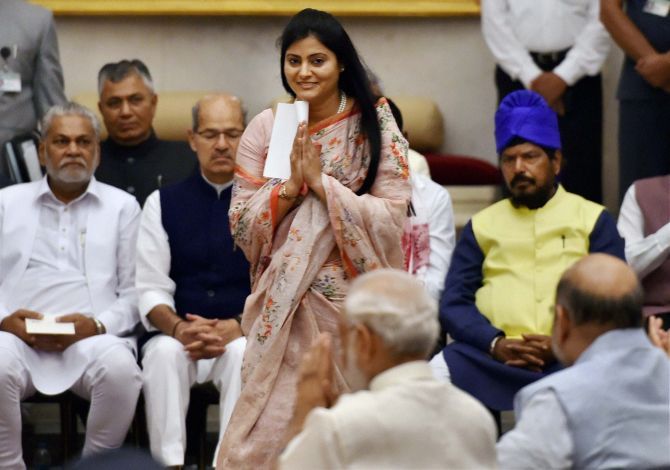
The induction of three new faces from Uttar Pradesh in the Modi government on Tuesday reflects an attempt by the Bharatiya Janata Party to reach out to the Dalit community and dent social engineering formula of Mayawati’s Bahujan Samaj Party ahead of the crucial 2017 assembly election in the state.
UP now has 16 ministers, the maximum from any state, in an apparent bid to keep the Dalit and other backward class votebank content.
The exercise shows that the BJP is wooing Dalits who have largely voted for the BSP in UP in the last two decades. Any gains among the Scheduled Castes will help the BJP inch closer to its target of winning 265 of the 403 assembly seats in the state.
The prominence given to Apna Dal leader Anupriya Patel, a Kurmi leader from eastern UP, is seen as the BJP’s move to pre-empt rise of Bihar Chief Minister Nitish Kumar, another Kurmi leader.
Her inclusion in the Council of Ministers is apparently aimed at consolidating backward votes, especially eastern parts of the state where Nitish has been trying to make a foray ahead of the 2017 assembly polls.
So far, Nitish has held three rallies in UP and plans another visit later this month.
Anupriya, a first time MP, is an eloquent pro-Modi voice within and outside Lok Sabha whose OBC roots have positioned her as an important BJP ally in UP.
The 35-year-old Lok Sabha member from Mirzapur in UP won on the ticket of Apna Dal, a party founded by her father and Kurmi leader Sonelal Patel which later split, with the major faction siding with her mother, who expelled her from the party.
The support of BJP, Anupriya’s associates say, can help her claim the legacy of her father who built Apna Dal’s base among OBCs, primarily his fellow Kurmis.
BJP believes that a ministerial berth will give her the stature and gravitas required to work on Kurmi voters, who play an important role in deciding the fate of candidates in certain parts of the Hindi heartland.
Her speeches in the Lower House on various issues have often drawn praise from the treasury benches.
The swearing-in of Shahjahanpur MP Krishna Raj is also significant ahead of the UP polls as the SC community forms a sizable chunk of the electorate.
49-year-old Krishna Raj belongs to Pasi community, which is also part of the large Dalit votebank. She is a first-time BJP MP and one of the party’s Dalit faces from UP.
Raj was elected in the 2014 Lok Sabha polls from Shahjahanpur seat after her two stints in the UP assembly in 1996 and 2007.
She belongs to the Rohilkhand region of the state and her inclusion in the expanded National Democratic Alliance ministry will give more teeth to the saffron party among SC Pasi electorate.
Exercising precaution not to annoy the upper castes, the exercise includes a Brahmin face from the state.
The induction of Chandauli MP Marendra Nath Pandey, a prominent Brahmin leader from eastern UP, is a clear indication by BJP to woo the Brahmins.
The 58-year-old leader is a two-time MLA and his induction is seen as an example of the BJP going the whole hog to win after being out of power for a decade-and-a-half in the state.
The party apparently does not want to leave anything to chance as far as retaining the upper caste voters is concerned, more so after the expulsion of state BJP chief Laxmikant Bajpai.
Pandey’s induction in the central government is being seen as an attempt to reach out to the significantly large Brahmin vote bank in the state.
The Brahmins, who were traditionally Congress supporters, had been siding with BJP in the post-Mandal era. However, a large chunk of them later also voted for the BSP.
Uttar Pradesh now has two ministers from Rajput caste -- Rajnath Singh and V K Singh; three Brahmins -- Kalraj Mishra, Mahesh Sharma and Mahendra Nath Pandey; and two Kurmis -- Santosh Gangwar and Anupriya Patel.
Besides, Niranjan Jyoti belongs to OBC Nishad community, Sanjeev Balyan is a Jat, which is a key votebank in western UP, Uma Bharati, a Lodh, another backward community, and Krishna Raj, a Dalit.
The lone minister to be dropped from Uttar Pradesh in exercise is minister of state for human resource development Ram Shankar Katheria, a BJP MP from Agra belonging to the Scheduled Caste.
He was recently in the news for making controversial statements regarding saffronisation of education.
Katheria was also in the news for wrong reasons after the Aam Aadmi Party and the BSP alleged that he possessed fake graduation degree.
A case was filed in 2010 by Katheria’'s rival BSP candidate in Allahabad high court accusing him of with forging his mark-sheet.
According to the complaint, he had forged his Hindi as well as English marks, a charge denied by him, saying it was a political conspiracy.






 © 2025
© 2025